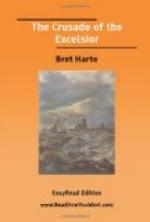And if he was that exception—what then? An idea which had sprung up in Father Esteban’s fancy that morning now took possession of it with the tenacity of a growth on fertile virgin soil. The good Father had been devoted to the conversion of the heathen with the fervor of a one-ideaed man. But his successes had been among the Indians—a guileless, harmless race, who too often confounded the practical benefits of civilization with the abstract benefits of the Church, and their instruction had been simple and coercive. There had been no necessity for argument or controversy; the worthy priest’s skill in polemical warfare and disputation had never been brought into play; the Comandante and Alcalde were as punctiliously orthodox as himself, and the small traders and artisans were hopelessly docile and submissive. The march of science, which had been stopped by the local fogs of Todos Santos some fifty years, had not disturbed the simple Aesculapius of the province with heterodox theories: he still purged and bled like Sangrado, and met the priest at the deathbed of his victims with a pious satisfaction that had no trace of skeptical contention. In fact, the gentle Mission of Todos Santos had hitherto presented no field for the good Father’s exalted ambition, nor the display of his powers as a zealot. And here was a splendid opportunity.
The conversion of this dark, impulsive, hysterical stranger would be a gain to the fold, and a triumph worthy of his steel. More than that, if he had judged correctly of this young man’s mind and temperament, they seemed to contain those elements of courage and sacrificial devotion that indicated the missionary priesthood. With such a subaltern, what might not he, Father Esteban, accomplish! Looking further into the future, what a glorious successor might be left to his unfinished work on Todos Santos!




